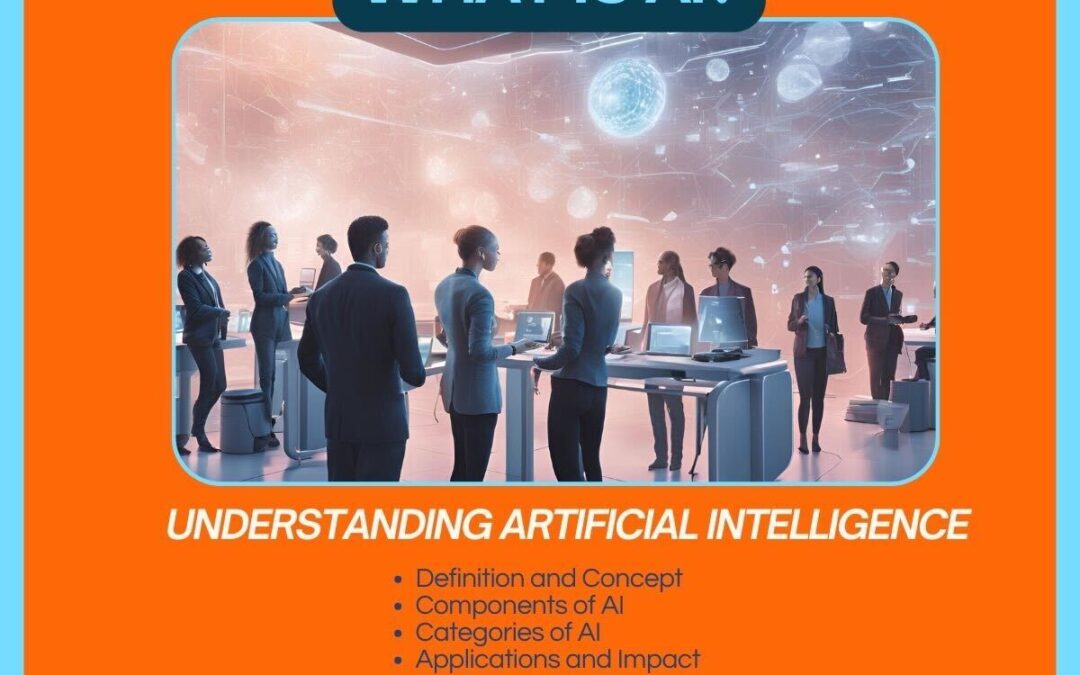Artificial intelligence (AI) is a technology that enables computers and systems to carry out jobs and tasks that would normally require human intelligence. Artificial intelligence systems can learn, reason, and solve problems by analyzing large amounts of data. They can recognize patterns, make decisions, and even create new content.
AI made it’s debut to the masses across media platforms almost a year ago. Experts and media showered us with information about it’s capabilities, encouraged to adapt quickly, and warned of the consequences if we did not.
Now, encountering AI is a daily thing, whether we realize it or not. From the recommendations on your favorite streaming service to the voice assistant on your phone. AI is behind many of the tools and services you use in your work and your play.
Understanding AI is not just for tech specialists and programmers anymore. Knowing how it works and what it can do for you and your business can help you in many ways like increasing productivity, content creation, generating code, developing projects, and so much more. Whether you’re curious about its capabilities or concerned about its impact, learning about AI is incredibly relevant.
Understanding Artificial Intelligence
Artificial intelligence (AI) is technology that allows machines to perform tasks that normally require human intelligence. It involves creating computer systems that can perform tasks that usually require human intelligence including recognizing speech, making decisions, and understanding language. The future is that some of these systems and machines will replace humans.
WalMart has been experimenting with AI-enhanced robotics for more than 5 years with the goals of remaining competitive, addressing labor shortages and supply chain issues. While the robots may replace some employee roles, other jobs have surfaced such as robotics mechanics.
Not only is AI being used in work from small business to industry to medicine, it has even reached pop culture and entertainment. One example is the latest season on Big Brother in the form of “Ainsley”. Artificial intelligence (AI) is already impacting many areas of life.
Key Components of AI Systems
There are several components that are crucial for AI systems.
- First, algorithms are step-by-step instructions that guide machines in solving problems. Not unlike an SOP for a process in a business.
- Second, data is essential as it serves as the fuel that drives AI learning processes.
- Third, computing power is needed for processing complex computations quickly.
- Additionally, neural networks are used in deep learning to simulate the way the human brain works.
- Finally, sensors and data inputs are needed to gather information from the environment.
Categories of Artificial Intelligence
Three major types or categories currently define Artificial Intelligence: Narrow AI, General AI, and Superintelligent AI.
Narrow AI is considered as a weak AI and defines systems that perform basic tasks, like voice assistants. If you are already using AI in your business, this is what you’re using.
Done4U™ uses AI with our clients who are interested in tapping into the productivity benefits that AI delivers. I personally, use it a lot because I love the time savings and depth of information that I get from it. For example, some tasks or projects that literally would have taken hours to complete in the past can take minutes to an hour using AI depending on what I’m trying to accomplish.
General AI aims to match human intelligence levels, able to perform any intellectual task that a human can. This is still theoretical and not yet available.
Superintelligent AI would exceed human intelligence, capable of outperforming us in all tasks. It remains a topic of research and debate.
Current Applications
Business: Small businesses use AI to increase productivity in many areas, gather information quickly, generate code, and marketing.
Finance: In finance, AI helps with risk assessment and management by analyzing personal information to decide who to lend money to. This makes the process faster and more accurate.
Medicine: AI plays a crucial role in healthcare. It can predict diseases, assist in surgeries, and personalize treatments for patients. This increases the efficiency of medical practices and improves patient outcomes.
Law: Legal professionals use AI tools to automate manual processes and improve efficiency. From document review to legal research, AI makes everyday tasks quicker and more accurate.
The Impact on Society
AI impacts the job market by automating tasks that humans used to do. Some jobs might disappear, but new kinds of jobs will also be created.
Education is another area where AI is making changes. Personalized learning platforms can adapt to each student’s needs, helping them learn better. I LOVE this because the concept of personalized learning has been around for decades but has been extremely difficult to implement. There are also social issues to consider. AI can entrench inequality (think ageism and hiring). If not carefully managed, it may benefit only those with access to advanced technology, widening the gap between different social groups.
Ethical Considerations
The use of AI raises ethical questions. For example, there are concerns about privacy since AI systems often need a lot of personal data. It’s crucial to ensure that this data is protected and not misused.
Bias in AI algorithms is another ethical issue. If the data used to train AI is biased, the AI’s decisions will be biased too. This can lead to unfair treatment in areas like hiring or lending.
There’s also the question of AI’s role in using sources without permission to create content. What is considered fair use and what is not? This is a complex issue that needs to be addressed carefully. Learn more here.
Conclusion: What Is AI?
Artificial Intelligence has a substantial impact on business. It has not only made processes faster but also more efficient and accurate.
With the rapid advancements, AI is continuously reshaping global society. This includes improvements in language and image processing, which are critical parts of AI technology.
Benefits of AI:
- Efficiency: Reduces time spent on repetitive tasks.
- Accuracy: Minimized errors in complex calculations.
- Innovation: New tools and technologies being developed.
Challenges with AI:
- Ethical Concerns: Ensuring fair and unbiased AI uses and decisions.
- Privacy Issues: Protecting personal data.
- Job Impact: Potential displacement of certain job roles.
Understanding AI is essential as it becomes more integrated into business and daily life. Being aware of and addressing its challenges will pave the way for using this technology successfully.


